#laudna meta
Explore tagged Tumblr posts
Text
Imogen's immense capacity for empathy for things wriggly and "wrong" and lonely, things grotesque on the outside with a pure sort of want a sincerity, a truth on the inside.
Ashton, feeling fundamentally broken, fighting for good, for a purpose, telling her she has quite a crew of broken things following her. Saying there's a reason for that. Himself and Laudna.
(Ashton counting themself and Laudna as kindred spirits, Ashton looking at Imogen and seeing some reflection of what Laudna sees.)
(Imogen saying - Ashton is good. That they're special. Imogen who does lethal things when it needs it, who has almost taken a level of satisfaction in Ashton's approving assessments of her lethality, her decisionmaking.)
Imogen says she likes the All Minds Burn, she actually does, Ashton agreeing, thanking her for backing them. Imogen and things cast away, things found as horrifying, and an almost inexplicable empathy. Ashton and things to fight for, things to throw their lot behind until the light in their skull goes out.
Its like, both so sudden and also- no i kind of get it. I get it. They're complimenting each other very intensely, openly, they're both laughing with a weird seed of a telepathic brain between both of them, walked into a den of danger and back out again and like. No. I get it.
#critical role#cr spoilers#c3e70#cr liveblogging#ashton#imogen temult#ive been so excited for them to hang out more but this surpassed my expectations tbh OH THATS SO CRUNCHY#migraine buddies#sorry keyleth!!!#this takes precedence!!#imogen meta#laudna meta#ashton meta#my meta#character meta
439 notes
·
View notes
Text
There's something to be said about how skittish Laudna was during the Chetney fight. She put as much distance between her and Chetney as possible, she immediately put up her defense with form of Dread, giving her an hp boost as well as using mirror image to decrease the likelihood of her being hit. Not only that, but she didn't use more obvious offensive moves such as eldritch blast to avoid making herself a target; this is the first major fight since being resurrected.
She's afraid. Afraid of dying again, Laudna has always been aware of the fact she's on borrowed time but after being so abruptly confronted with her own mortality, it terrifies her.
#cr spoilers#critical role spoilers#laudna#cr meta#laudna meta#it hurts to see a character who was once so comfortable with death now very afraid of it#but at the same time being confronted with your own mortality has shown her how important she is#im excited to see how this further manifests#launda needs a break#my meta
295 notes
·
View notes
Text
I do just keep thinking about Essek listening to Ludinus talk.
Essek, who will be on the run for the rest of his life for the deal he made with Ludinus.
Essek, who handed over unfathomable power to Ludinus believing it to be for the greater good and embroiling an entire continent in war as a result.
Essek, who helped orchestrate acts of espionage searching for the priceless artifacts that he had handed to Ludinus which the Empire, under Ludinus's puppeting, used to claim themselves righteous—defended themselves against unlawful invasion—in their war.
Essek, who once believed Ludinus a like-minded peer before discovering that in his eyes he was only something to be used and cast aside once his purpose was served.
Essek, who has seen the scars carved upon his dearest friends by those Ludinus has enabled as a means to his ends.
Listening to Ludinus speak of the damage that the gods have wrought. The wars they have waged at the cost of others. The way they have coerced and manipulated mortals into enabling their ends. The lives they have ruined and left in their wake without a care.
There are no gods walking Exandria, but there are monsters.
#VERY funny I drafted this like an hour ago and now he's having this conversation with laudna. BEST BOI#but god he truly dissociated the entire conversation. like imagine.#personally I think he deserved to rip ludinus's body apart with his bare hands but yanno. I get it. that doesn't serve the narrative.#however orym really should've slashed his throat#essek thelyss#critical role#cr spoilers#cr meta
609 notes
·
View notes
Text
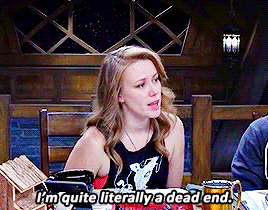
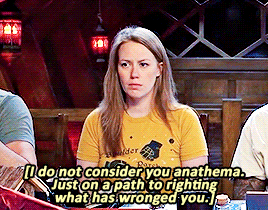
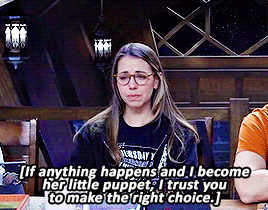
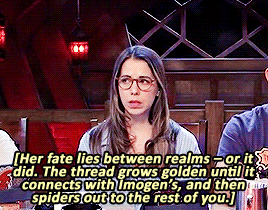

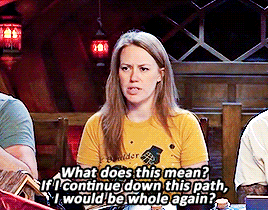
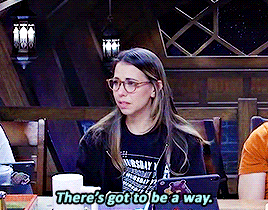
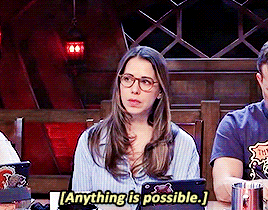
The silver color of the thread begins to fill with more golden light. (requested by @overnighttosunflowers)
#critical role#criticalroleedit#imodna#southerngothic#laudna#imogen temult#gifs#*#*cr#*request#*parallel#cr3#ship: imodna#laudna cr#raven queen cr#cr meta#*meta#scheduled#1h41m c3e77#4h35m c3e109#i hope this turned out okay! i was a lil sad i couldn't make some more direct parallels while also preserving the integrity of the scenes#but i think they're still there. you just have to look a lil closer#there's so much here. laudna barely able to even wrap her head around the idea of being whole again#what does this mean? who am i if not the dead thing i always thought i was?#vs. imogen smiling so quickly and brightly bc she /always/ knew it was true. she /always/ believed this would happen#she just needed proof and what better proof than the goddess of fate herself saying your fate has yet to be written#AND THE ROOM FILLS WITH HOPE. WAAAAH!!!!!
531 notes
·
View notes
Text
One day I’ll have the thoughts to write about how Laudna sees power as elevation, a chance to finally sit at the table with the lords and ladies, how Fearne sees power as corruption, her birthright being something she rejects and the scars that Lolth left on her, and how Imogen sees power as a responsibility, a destiny she has to keep in check
634 notes
·
View notes
Text
Cannot believe I didn’t realize it before but there is something SO juicy about Laudna asking Ludinus if he’s tried therapy in front of Essek “you should try friends sometime” Thelyss. And Ludinus answering “I’ve tried many things” like clearly not enough things. You’ve been presented two excellent suggestions by people who’ve both been at rock fucking bottom and you just laugh and brush it off. What the fuck have you tried anyway?
That is not my point though (the urge to make fun of Ludinus is simply too strong XD). My point is Essek seeing Laudna do what he did, suggest to Ludinus, even somewhat mockingly, that he handle his issues like everyone else. And I just wonder if that also contributed to him to him seeing the parallel threads between the two of them and reaching out to her at the end of the episode.
244 notes
·
View notes
Text
the thing is that the “laudna or delilah” debate i think actually misses the complexity of laudna as a character — which i think actually gets magnificently illustrated when marisha talks about and chooses her actions as laudna. like in the game, she tends to act comfortably as laudna even in those delilah filled moments once the initial indication has been made by matt that laudna feels that presence particularly in a given way. but the vehicle of a ttrpg as the medium in which laudna exists and interacts means that there is intractable ambiguity in the “did laudna do this or did delilah?” because the answer is always at the same time that both of them chose it as it is that laudna did, because matt always brings in delilah as a reaction to the choices made, either by laudna in the narrative or by marisha as the creator orienting laudna’s choices. like tonight, marisha certainly didn’t say I’m Looking At This Sword Appealing to Delilah, but she did have laudna who was traumatized by that sword engage with it while also engaged with an action she has pointedly and continuously accounted as a coping mechanism from years of solitude with nothing but the voice in her head. laudna didn’t choose to have delilah in her mind, but she did choose to ask for more power, she did choose to act without orym’s input, she did choose to use her form of dread, whether or not she chose the form which it took. especially with the the indicators that this is a storyline alluding to addiction (something i’ve long suspected but has now been affirmed by marisha in the cooldown), it is extremely compelling that laudna is both insistent of her own responsibility when it comes to intentions but is absolutely avoidant to the point of absolute denial when it comes to consequences. this was especially apparent when imogen asked if laudna’s choices and actions were all her own and laudna insisted they were, but then ended the episode with a form of dread the image of delilah briarwood fading from around her as she repeated “i didn’t mean it.”
it is particularly interesting when she is alongside imogen because i think the thing that is the most compelling to me about them right now si something that laura (iirc) alluded to in the cooldown about how imogen has chosen a significant turn away from predathos at the same time laudna has leaned in hard to delilah. in a lot of ways imogen has been very like laudna when it comes to the importance of intentions vs. consequences, at least insofar as her experience with her powers led to a different kind of isolation than laudna’s but still led imogen to experience situations in which she was confronted by the cruelty of thoughts much more expediently than she was with the cruelty of actions. and while laudna has experienced the cruelty of actions, she ties those intensely to bad intentions as well — cruel actions come from cruel thoughts. i mean, that’s what fun scary refers to — in that first interaction with those kids, we get a clear though undoubtedly unintentional insight into the perspectives that laudna and imogen both have on the cruelty that the world contains. laudna sees no harm in the fear she instills in those children because she loves kids, her intention was fun, her actions can’t be truly harmful if she never intended it. and interestingly, imogen disagrees that laudna is fun scary at all, she actually points out that laudna is scary scary, but in a good way.
and so we have this dynamic between two characters who have been the balms to one another’s solitude — which, as has been expressed in other posts, in both cases emerged from their commitments to their outlooks: laudna continued to appear as a witch on the outskirts of town, likely engaging in haunting behaviour if her actions throughout the campaign have been any indicator, and continued to run until, interestingly, someone who could read her mind was the first person to truly realize she meant no harm. imogen isolated because she was inundated with thoughts and turned misanthropic because of how often those thoughts were negative and cruel, until someone (who partakes in actions that can very easily be considered at least appearing to be negative or scary) had thoughts that were good. and they fell in love — with a confession scene where laudna raised concern that she might be a bad person, because she herself had ill intentions in reaction to bor’dor (absolutely mediated by deliliah, but her own emotional reaction that prompted that mediation). and imogen’s rebuttal isn’t a reference to laudna’s choices or her actions but to the thoughts she’s had that imogen has been witness to.
except. except it’s been months and imogen has a mother who had the best of intentions to start with . intentions that look a lot like imogen’s own, but now she stands at the side of a man willing to risk the entire world so that he can (ostensibly) no longer have to deal with divinity. imogen’s mother who allows the murder of countless people, of every member of the hells themselves except imogen, of oryms family, to get the answers and the solution that imogen herself is looking for. and as imogen has gotten further in the journey, the role of thoughts and intention has become apparent in its limits. because it’s true that they are important, it marks a difference between ludinus and liliana absolutely when it comes to likelihood that they might have a path for redemption, but it doesn’t mark much of a difference for the lives lost. and imogen has become much more concerned with this, i think maybe most clearly in her decisions around her last few predathos diving dreams because her hesitation hasn’t been that they need to consider the sides more, it’s been that, regardless of her intent to come back to the hells, to get information for their mission, her will might still lose the fight against the pull of predathos and if she’s forced to be this vessel which might allow it free, it might not matter as much what her intentions are when she dreams.
and at the same time. laudna has been confronted with the same evidence that her worldview might not paint a complete picture, but she’s still looking at that incomplete image as the whole. as is clear in her reaction to liliana, where she sets up her position to imogen by referring to her own love for her — for laudna, liliana must not actually love imogen, couldn’t possibly if the outcome of her actions is imogen growing up without her mother and liliana aiding and abetting (even if occasionally Maybe limiting) exandrias mage criminal of the decade. except, as imogen who has started to be checked on her flawed thoughts > actions perspective points out, that inconsistency isn’t one that laudna is immune to — laudna loves imogen and the hells and undoubtedly wants to see them live in a world they can thrive in, but she’ll also give up pieces of herself and make decisions without their input that have implications for those she chooses to exclude as evident in her choice with the sword,
and so tonight’s everything was delicious . when marisha’s interparty conflict beam hits it hits and it did tonight but the conversation between laudna and imogen was truly truly fantastic and so compelling because you get both laudna so locked into the familiar comforting behaviour that thinking that her intentions are all that matters is and being confronted by the fact that right now the consequences seem so enormous that the comfort is cold and imogen realizing that the thing that she’s been struggling through with her mother — and don’t get me started about imogen’s response to her mother saying she’s made her choices for imogen and the fact that laudna’s first explanation of why she chose this was a similar appeal to protecting imogen — is the same thing that has a hold of the woman she loves, though in different forms. and god, not to add another unnecessary sidebar, but laura is truly so good at coming up with heartwrenching prompts? dialogue? i dunno what to call it but the way that taliesin is insane with one liners, laura is like that with setting up conversations and then eventually spiking them into my heart because jesus the “i just watch. [as she plunges a dagger into her heart]” “i’ll always love you, i just don’t know what to do with it” “i didn’t mean it” “i know” because that’s the thing, that’s the struggle . ethel cain voice directed at laudna and liliana. imogen temult loves you but not enough to save you. because it doesn’t matter how much anyone loves laudna if she still believes in the necessity of delilah, it doesn’t matter how much anyone loves liliana if she still believes her presence at ludinus’ side is a requirement. and that’s not to reduce the degree to which they both have undoubtedly been trained to believe those things, but it is to say that both in the text and in the real world situations to which people love to refer when reducing agency to make characters more girlboss or whatever — it’s actually explicitly the role that laudna ascribes to her own emotions and choices and value that will lead her to a life where delilah does not have full reign.
the ambiguity and complexity is that as long as laudna wants (which translates to a need for her) her power, she wants delilah and whatever words that delilah will feed her to validate the need for and/or increase that power, which means that her actions are always her own, and the consequences are always hers to bear. the messiness is her continued insistence on separating intention from consequence — because laudna never means harm, for her it’s about protection, even power doesn’t seem to be power for its own sake. even with orym tonight it was about protecting orym from the sword, but also of course about finding power for delilah so that deliliah might also grant her more power so that she can help save imogen and the hells and the world. but that means when she explains to others she can make claims like i didn’t mean to, or that the choice was all her own because as incorrect to anyone else, laudna has completely committed to her founded belief that intentions matter more than anything else when it comes to the judgement of someone and their actions.
#laudna#imogen temult#liliana temult#imodna#cr3#critical role#cr spoilers#laura bailey#marisha ray#imogen + laudna#cr meta#apologies for typos or half thoughts i’m writing this on mobile with half asleep brain cells
292 notes
·
View notes
Text
a brilliant setup in campaign 3 that will finally begin to come to fruition next chronological episode is that ludinus is staring into the faces of people who pretty much all directly represent his sins and how they've hurt people. imogen is the manipulation & abuse of ruidisborn (specifically liliana). fearne is also representative of ruidisborn but also the way ludinus has hunted & slaughtered fae to extend his own life, how he has manipulated their courts. laudna is the wanton unchecked cruelty of the cerberus assembly. fcg (there in spirit) is the idolization of aeor and choosing to bring what brought it down back for all of exandria to bear. ashton (and while this post is about the bells, it does extend directly to essek) is the experimentation on the luxon that started an entire war because he wouldn't turn the beacons over to a culture he despised & oppressed. orym is the decimation of the ashari for a mere test run. chetney is the corruption in the greying wildlands, the destruction of molaesmyr simply to contact predathos.
#i do not expect ludinus to change but i do wonder#he seemed sad when he had to tell imogen about her mother. telling caleb he knew about what trent was doing#it is inexcusable. to be so complicit & active in brutality#but he has..... thoughts on it and his own place in it. we know that#i wonder what happens when confronted with every single ghost at once#it's not just laudna's spell (which summoned vess's soul as well??) that haunts this chamber#ludinus da'leth#critical role#critical role meta#campaign 3#imogen temult#fearne calloway#laudna#chetney pock o'pea#orym of the air ashari#ashton greymoore#fcg#long post#van speaks#essek thelyss
186 notes
·
View notes
Text
Laudna going through a spiral about whether Ashton is a bad person because he wanted the power of both shards and did something stupidly dangerous to do it vs. Laudna deliberately feeding Delilah by using Hunger of the Shadow on Bor'Dor and Willmaster Edmuda.
Absolutely love it. Girl please keep projecting your worst fears about yourself and destructive habits on your friends and get scared of them without ever stepping back and assessing your own actions, it is delicious.
Bonus points that Imogen and Laudna are the biggest enablers of each other and not at all inclined to check each other's negative behaviors. Imogen still has a healthy fear about her powers, though, especially right now.
Meanwhile Laudna is still convinced that Orym is fine and the stable one while no one questions how Orym got Hex or that he's willingly using Ludinus' Quintessence Array to drain Edmuda of her life force. A totally normal stable good guy thing to do. Definitely no nosedive here. Although Laudna is irritated at him for pressuring everyone to keep going and not back down, and that he got the Quintessence Array use and not her. (Because again, she is trying to feed her own need for power.)
Somehow Fearne is the only one who's beginning to think they all might be going too far and getting scared, but they're not really listening to her. She saw her potential to become Dark Fearne and actually reevaluated her life. (Even if she's still a chaos being.)
Bell's Hells are great because they're like NPCs who ended up as the B-Team who keeps happening to be in the right place at the right time to be in the middle of all these events leading to this cataclysmic events that are so much bigger than they are. It's FUN that it's happening faster than they can recon with it and they're getting more and more desperate to not go under in a way that is actually making them go under faster.
They're seeing it in each other but not in themselves. That's the tragedy. They're so desperate to win it doesn't matter at what cost anymore. They're all just competing to see who can sacrifice themselves for the cause first while dragging their enemies down with them. They're going to end up being the monsters someone else has to fight, even though they kept trying to do good and fight the darkness.
#critical role#critical role spoilers#critical role meta#critical role campaign 3#Bell's Hells#Laudna Critical Role#Delilah Briarwood#Orym of the Air Ashari#ashton greymoore#imogen temult#fearne calloway
347 notes
·
View notes
Text
I made a post about Laudna and Orym’s interaction in ep102 yesterday as it relates to Orym’s broader arc, but I wanted to follow it up with one more purely about Orym and Laudna’s relationship.
I think that on a fundamental level, Orym simply doesn’t understand Laudna. I don’t know if he’s aware of this. I do think he loves her. But I think that he also can’t stop seeing her as a symbol.
Orym has spent his whole life hearing about history by proxy. He’s one of the only party members with a history proficiency. He knows Keyleth, and he knows about the Sun Tree bodies. So when he learns about Laudna’s “worst thing that ever happened to her,” he sees her double: as his friend who suffered tremendously, and as the effigy of Vex that Delilah constructed.
And that weighs on him. We know it still does. When he spoke at Laudna’s res ritual in episode 38, he told her that she deserved to be more than a footnote in Delilah’s story. This was then echoed almost 60 full episodes later in episode 96 after swordgate, when he told her that she deserved her place in history as much or more. He continues to position her in relation to Delilah in a way that shows some part of his mind is always remembering that she was meant to be an NPC in someone else’s story: the way she died, the tool she was.
And that’s the other thing: that Orym has been the person most visibly uncomfortable with Laudna’s undead nature. It freaked him out long before he knew about the Sun Tree, and though he’s gotten used to it, he’s still hyperaware—we see this in his interaction with his sister in episode 66.

He defends Laudna sincerely, but he also seems self-conscious in a way that the transcript doesn’t fully capture. He knows Laudna is weird and he loves her despite it, not because of it. He still looks at her and sees a dead lady who happens to be Laudna, not Laudna who happens to be a dead lady.
There are other complicated elements to their relationship as well, of course. Swordgate, for instance, is indicative mostly of Orym’s (very human) tendency to act from his own trauma first before thinking about how it affects his friends, rather than anything specific to Laudna. But it did affect Laudna most of all. When he realized just how badly his taking up Otohan’s sword hurt Laudna, he vehemently threw it away—but not before he’d spent quite a while defending his right to bear it. Things had to really go south for him to stop and consider her experience. He loves Laudna, but he does not intuitively get her, and—even in better circumstances—he’s not always very good at stepping outside himself to try.
I thought it was interesting that Laudna wanted Orym specifically to be the one to kill her should the need arise. Obviously, this is most directly attributable to his status as the party member who “always does what’s right,” and on a secondary level it represents a meaningful shift in her relationship with Imogen: in episode 77, she’d asked Imogen to be the one to “make the right choice” if need be, but I think she now understands how impossible and torturous a request that is. Orym, though—Orym would be able to do it.
And he would. Not because he’s the infallible pillar of morality that the party thinks he is (which after all implies that killing Laudna to kill Delilah is the definitive “right” choice—something far more debatable than Laudna believes). Not just because he’s a soldier who follows orders even if they tear him apart inside. But because he’s able to see her as something other than herself. She’s his friend, but on some level, she’s still also the worst thing that ever happened to her. We even see this in the Delaudna battle itself—when he entreats Laudna to hear him and resurface, it’s by telling her that she’s suffered enough.
And for Laudna, being the worst thing that’s ever happened to her doesn’t mean being a symbol of someone else’s collateral damage. It means dying, and it means waking up with Delilah in her head. She thinks of herself as a person carrying around a monster, or on her worst days as inextricable from that monster or even as a monster herself. So if she senses that Orym can see her as something other than herself, surely he’s capable of seeing that, right?
Whether or not that’s true is debatable, and probably the subject of its own post. What’s important here is that Laudna knows Orym loves her but stands at a distance from her. That he’s able to see her as something other than a person in a way that Imogen never could. And whether that thing is a monster or a symbol of pain, that he sees her as something that has suffered enough to, if not kill out of righteousness, at least mercy kill.
So she lands on this. Surely he’ll do the right thing. He won’t want to. It might keep him up at night. But he will.
#laudna#orym#orym of the air ashari#cr3#cr meta#this is not an orym hate post! this is me rotating him around in my brain#marisha and liam create interesting relationships every time and this one is no exception#c3e102#mine
149 notes
·
View notes
Text
There's some kind of connecting thread - and I can't quite articulate what it is - between Laudna's reaction to Bor'dor's betrayal, her reaction to Ashton taking the fire shard, and Orym carrying Otohan's sword.
In all three situations, someone deeply, deeply hurt did something that was grounded in their personal grief. And in all three cases, Laudna's reaction was of extreme, personal betrayal. (This isn't critical of Laudna, btw; she's a fascinating character and I think Marisha is doing an incredible job of leaning into the reality of how trauma can make you act in heightened, messy ways that are very difficult for everyone around you.)
Everyone was hurt and shaken by what happened with Bor'dor and Ashton, and understandably so, but I think it's telling that Laudna phrased both events as, specifically, a betrayal. 'I can't be betrayed again,' as she drains the life from Bor'dor (as opposed to, say, Orym's attitude toward killing Bor'dor, which was less 'we need to kill him because he betrayed us' and more 'this is a grim necessity, because we are at war.') Ashton does something incredibly ill-judged, and Laudna's interepretation of it is 'they betrayed us.'
Orym takes Otohan's sword, and Laudna sees it, again, as a personal affront. She challenges him for having the audacity to carry it. The sword killed her. (It also killed half the people in the room, including Orym.)
Something... something about how Laudna saw Ashton trying to absorb a powerful magical artefact because he'd convinced himself it was the right thing to do, and felt so injured that she ran into the forest for a night. Something about how Laudna tried to absorb a magical artefact because she'd convinced herself that it was the right thing to do, and felt injured by Orym's defiance.
I don't have a clear point here; Laudna isn't a character I've studied as closely as some others (and I would very much appreciate anyone who has been analysing her more deeply offering any input!) But one thought I had is this: Laudna once said that the worst thing that could have happened to her has already happened. And I think maybe Laudna sees what happened to her as the worst thing that could happen to anyone. It seems hard for her to understand how much the actions of those around her - be it Bor'dor being radicalised, Ashton going about their attempt to understand themself in entirely the wrong way, Orym trying to reclaim a painful piece of his past and turn it into a promise - can be rooted in a pain that might be equal to her own.
Of course, it's hard to tell how much of it is Laudna at this point and how much is Delilah, but... honestly, it is such a bold choice for Marisha to do this. Because this is what trauma does. It makes things feel personal that might not be directed at you at all. It makes your grief into an enormous monolith that towers over your life, and can overshadow, in your head, anyone else's. It makes you want to protect yourself in every way possible when a flicker of it occurs again.
And... I think it's another sign of how much Delilah is taking from Laudna. Because who in this story has been fixated on their own grief and loss, to the point of ignoring the pain they cause in their attempt to fix that loss at any cost, than Delilah Briarwood?
#gonna keep thinking about this because i'm sure there's a clear connection and I can't quite put my finger on it#again: this is not critical of laudna as a character! please don't take this as an attack on her#just... trying to get inside her head y'know?#her actions are hurting people. i want to analyse what's up!#critical role#cr spoilers#cr3 spoilers#laudna#my cr meta
310 notes
·
View notes
Text
So. I think its worth noting that Laudna works to match the energy of other people in conversations, and I think its most evident here, with Ashton, but i feel like it is something she generally does. And she's, honestly, very good at.
Despite the cheery demeanor and the *waves hands around black goo* Laudna, especially in one on one conversations, will- be a little more hopeful, comforting, with a rattled Imogen. Gleeful and enthused with Fearne and fire, appreciative of fine art and craftsmanship with Chetney. And like, not within absurd extents, people do this all time.
But with Ashton, it becomes VERY apparent, because Ashton's vulnerability and Ashton's talks with Laudna especially are laid on foundations of. Harsh honesty. Pressing into bruises to see where the other person is hurt (to let them know you see them, that you're there for them). And Laudna matches it! Its something that's very- lots of teeth, but not quite a threat. They trade harsh questions and dismissive statements and painful honesty, a barter of vulnerability and discomfort. It is a sign of- respect.
And this conversation, I think, shows the extent to which Laudna has figured out how to navigate this, with Ashton, specifically. The barbed questions, the tit-for-tat of statements that press into recent bruises and offer up your own. It is not perfected yet, there are still statements that brush too far, moments where they bite back reflexively, where they mean it- i know loneliness. i literally pledged myself to one of the worst people Ive ever met, to work for them for years, for a bunch of people I haven't seen since.
But at the end of it all, Laudna cuts the hovering, the layers of back and forth, and sinks in a little deeper- "I've never known such kindness. And maybe, Ashton, you should cut yourself some slack, and let yourself feel the same."
At the end of it all- Ashton answers her questions, in their own way- about his past, about their losses, about the love for this new group and the fear with that.
"You know, I love you all, just a little bit."
"And you hate us just a little bit too."
They ask "Did you just what The Fuck Is Up With That me?" and that's the crux of it, right? Learning languages, prickly as they are.
#critical role#c3e49#laudna#ashton#cr liveblogging#dying buddies#character meta#laudna meta#i feel like! i unlocked something in my own brain about laudna and why ive been hesitant to be sure we know about what laudna is actually#thinking. AND i unlocked something about discomfort being a necesary part of love and kindness for ashton (in their view at least) but that#should be its own meta#anyway. WILD. wow. :o#i do think they both won there- laudna got some answers and ashton got to open up a little.#speculation#my meta
486 notes
·
View notes
Text
Critical Role's Cameraman
So, Critical Role (@criticalrole) just released their newest opening title sequence, an animated sequence in the same style of Your Turn To Roll and I would be remis as a film nerd to not pick apart every detail.
What fascinates me about this introduction, however, is the camera movement and shot composition. Allow me to explain.
I DONT THINK THERE ARE SPOILERS AHEAD, BUT JUST TO BE SAFE

So, we open with a hand, this is a close up, I don't think that is unobvious.
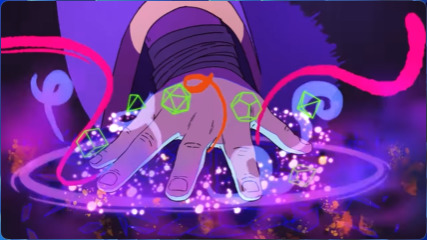
But this stops being a close up rather quickly, before it starts moving away. The shot just gives the hand context, and suddenly you aren't in an extreme close up of a hand, you are in a medium shot of a very large person. Then the camera pans backwards, and you can see villains and places spring up, although the perspective on Matt remains weird. Is he a few metres from you, or a hundred? How big is the Game Master here? There's a sense of mystery, of incomprehension. This is setting up some cosmic horror shenaniganry.

Then, we get Fearne. This is a wide camera motion, swivelling around her in a tracking shot that focuses on her face, and those eyes. It is like a reverse panorama, where Fearne is taking in the world, the world is observing Fearne.
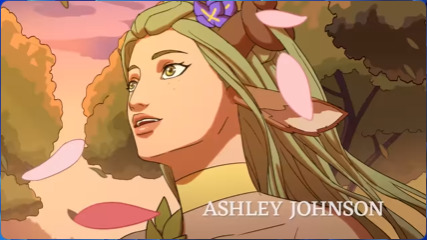
But I want you to take note of the leaves here, because they are used to form a connection between her and Orym. The transition uses them, while it isn't a direct wipe transition (the leaf just flies close to mask an abrupt cut), it is framed as one. The name of that isn't important, though, what's important is the leaves. By being in both shots, they emphasise the relationship between the two characters. But where for Fearn they show off her sense of wonder, for Orym, they take on a very different meaning.
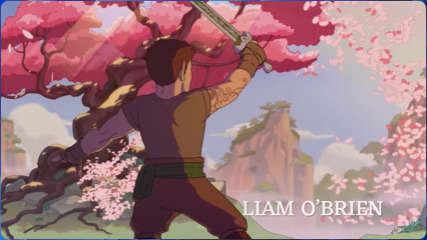
Notice, however, how still this shot is. There is no sense of danger here. This is a scene of a warrior with a sword and two people passing on from this world. But it's calm. Because this is a memory. Orym might not be at peace with the death, but the memory isn't a violent one, it's a memory of his family's lives.
Cut to a close up. Orym creates a gust of wind.
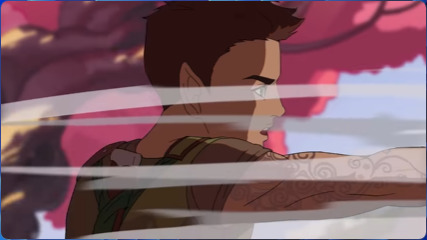
And cut to the next shot.
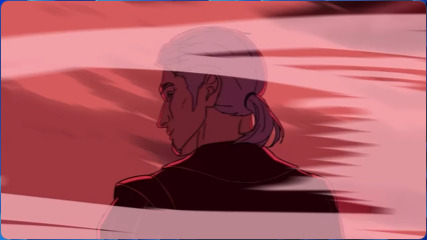
I will not lie, Bertrand is my favourite character across all of Critical Role, so this shot of him made me smile, but it isn't the point here. The point is Imogen's introduction.
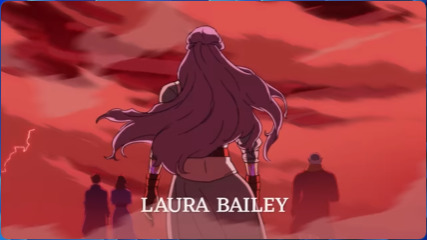
Although is Bertrand not actually the point? Because take a look at how Imogen is shown here. Do you notice anything?
She's shown in the exact same way. Imogen is shown doing the exact same thing that those who have died have done. And she can see them ahead of her. The camera panning back shows a wider perspective here, showing her as she tries to run, tries to get away from the same path as Bertrand.
The wind from Orym's blade that came to this scene gets across a consistent element: Memory. This is a dream. But dreams can become nightmares.
As Imogen loses her footing, the camera gives some of its wildest movements yet. It tumbles around her, then looks up.
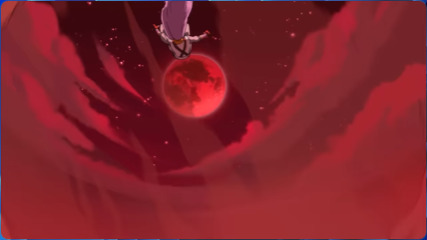
The camera stops moving when it sees the red moon, because now the viewer has something to orientate themselves around. There is a constant point, and we can see Imogen falling down. And getting closer, and closer, and closer, until.
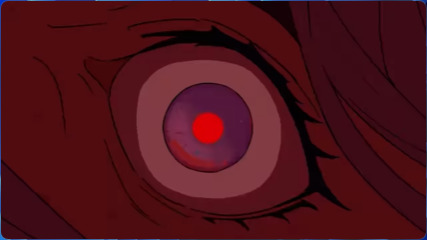
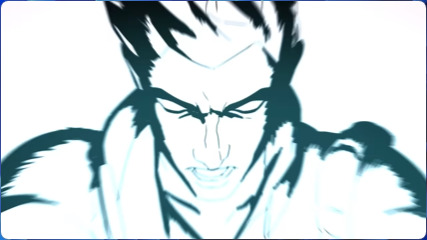

These are the three frames in order, there is nothing in between.
Imogen crashes into the screen, and we get an abrupt impact frame (that's the black and white one) then Ashton. This is so cool to watch, in my opinion, but it is quite possibly the opposite of smooth in camera work. So why is it so cool? Motion.
The motion is in towards Imogen and out away from Ashton. They are both falling, just in different directions. And the impact frame both helps smooth over and accentuate the abrupt transition.
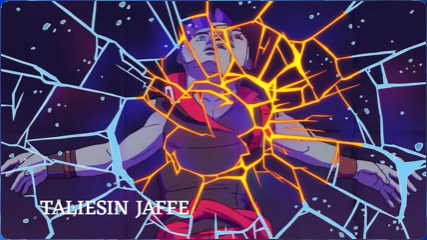
The camera around Ashton is a tracking shot. They are falling, but they remain the exact same in the screen (shrinking slightly). The rest of the world moves. And when Ashton lands, the screen cracks. The tracking shot is used to show Ashton's disassociation with their surroundings. Not in a "I feel nothing" type of way, but in a "it's me vs the world" type of way.
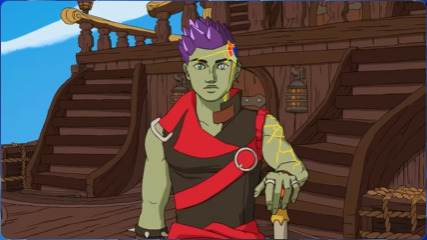
Then, there is an abrupt cut away. Nothing hides or smooths this at all, because Ashton's memory isn't smooth, and neither is Ashton. Remember the disassociating thing I mentioned, now it changes again to someone who gets lost in his thoughts. Medium.com calls this an "anxiety stare" and as someone who does that on the regular, I can attest to this abruptness being exactly what that feels like.

I'm not going to talk too much about the ship, but just be aware that there is a Dutch angle (the horison is diagonal) here to heighten the stress of it.
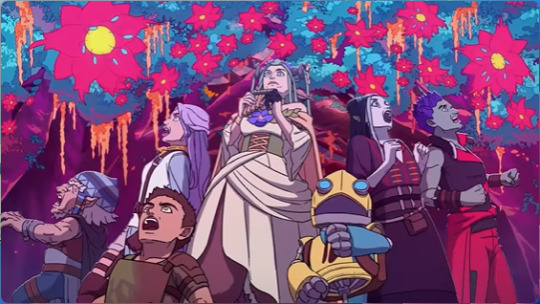
Likewise with this shot, there isn't much to talk about. The slow outward zoom and triangular composition are neat, and the tiered reactions (bottom row reacts, then middle, then Fearne) are amusing, but other than that, not much.
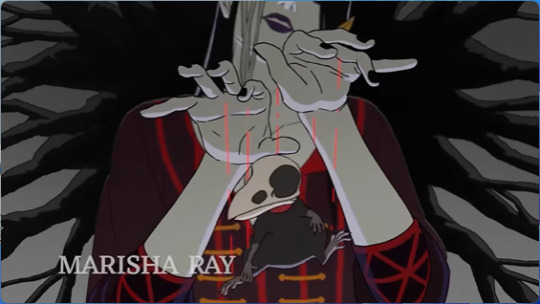
Then we meet Laudna, playing with Pate and giving him life. That's a neat little shot, I wonder if there's a metaphor there.
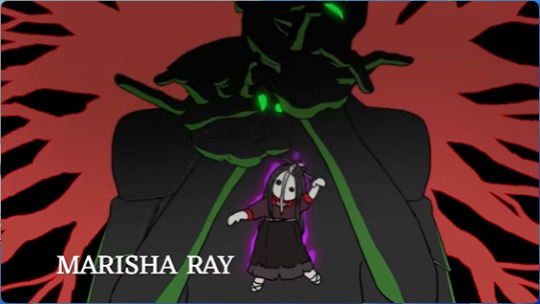
Oh.
This is a super cool visual because it establishes exactly who this character is in two seconds. But I also want to point out the symmetry of this. The hair becomes the blood which becomes the hair again, and then the tree.
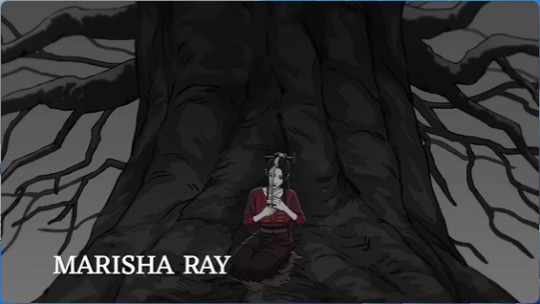
Laudna is introduced as big and scary and imposing, and that is very intentionally undercut by making her look small.
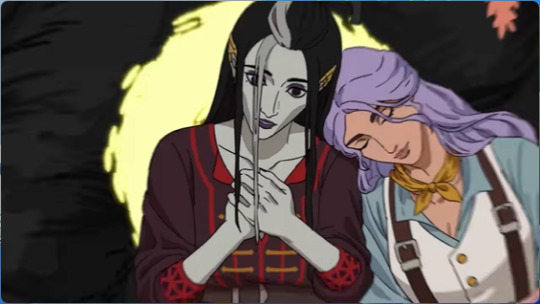
Being small means you are less likely to be the focal character, so shrinking Laudna takes away her agency. Only to give it back through Imogen, and when the camera pans back outwards, Laudna is the same size, but the colours and the surroundings make her feel less alone, and as a weird result of that, less small.
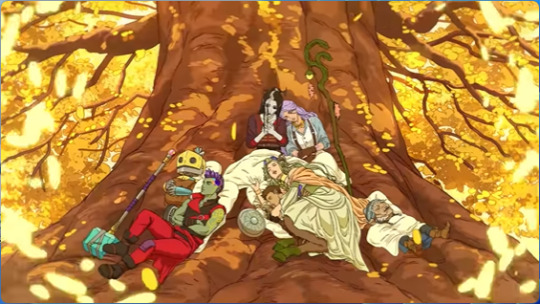
And last but not least in this moment, there is the delayed drop of the hands. Laudna finally feels safe and finally breathes a sigh of relief.
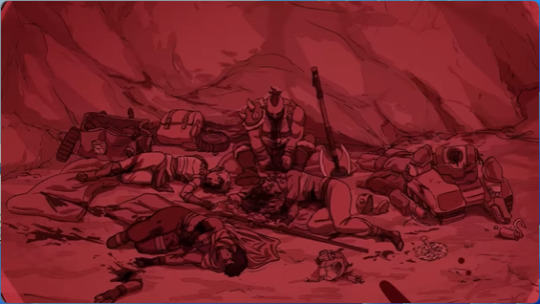
That, however, imediately match cuts to this. FCG's vision. The red tinting has obvious implications that I don't need to explain, but the match cut heavily implies a connection between this group and the Bells Hells. There is a fear that this might happen again made clear by a single transition.
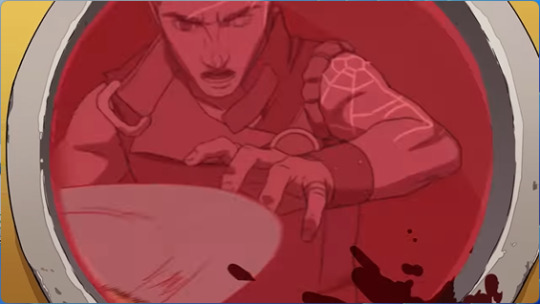
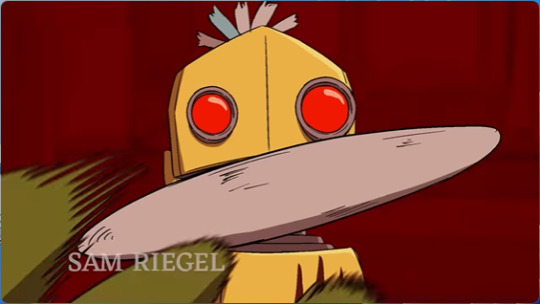
Here's something else. FCG doesn't move. At least, the camera doesn't treat them as moving. It's a slow panning out as if nothing is happening. It's the disassociation vibe that you get from Ashton's falling shots now repurposed to someone who isn't in control of their own actions. This is what FCG is afraid of, this is the important pieces of his character. This is FCG.
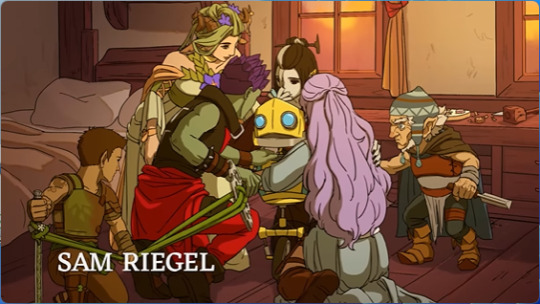
And just like Laudna, FCG finally gains agency when surrounded by their friends who hug them, and FCG finally moves.

Chetney Pock O'Pea, outlaw of the RTA, alpha of his own heart. A fundamentally chaotic character who takes rules as suggestions to be intentionally ignored. A man who's first instinct upon meeting you is to consider how you could be killed. And he is introduced whittling, with a steady camera and warm light illuminating his face. This is a peaceful side of Chetney, there is a duality to him.


Speaking of which, notice how Chetney draws back from the light as he transforms. His eyes begin to glow, but they don't illuminate him, until this:

Chetney is now backlit by the cold light of the moon itself (There's a neat reveal of Ruidus caused by the pan, but that's only tangentially relevant). Notice how much further you are from him here than in his first shot. But notice how much of him is visible, and how much of the screen he takes up. It's the same, this is still the same character. It's a true Doctor Jeckyl and Mr Hyde character. This isn't split personality, but a character who can be a different person in each form, while still remaining Chetney at all times.
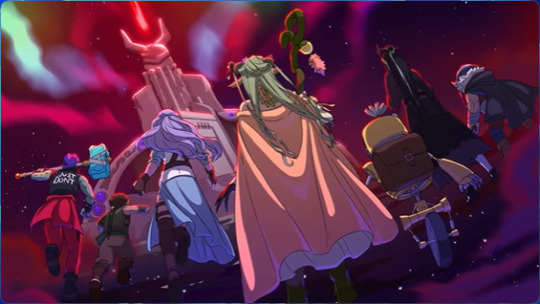
There is more in this video. I encourage you to watch it, but unfortunately, Tumblr has a limit on how many images I can include, so I will leave you with this final shot. A group of heroes looking up at a threat that is so much bigger than them, a threat that is literally controlling the light. But the Bells Hells are closer to the camera, they take up more of the screen. The battle isn't lost, instead, it is just starting.
#rants#literary analysis#literature analysis#media analysis#critrole#critical role#bells hells#imogen temult#laudna#ashton greymoore#fcg#orym of the air ashari#fearne calloway#chetney pock o'pea#its Thursday night#critical role bells hells#meta#meta analysis
523 notes
·
View notes
Text
I do want to call attention to this small exchange after Caleb has delivered his advice to Imogen, and before she asks him for further advice about her mother:
Caleb: I know we haven't known each other much at all. Imogen: Thank you, Caleb. Wow, you and Essek, I see why you work.
Imogen says it in kind of an amused way, and looks to Laudna for agreement. It feels she may be remembering that Laudna received assurances about her own fears—about Delilah, about her power, about herself—from Essek, and now Imogen receives advice from Caleb about a similar array of things: her talent, her role in the situation, and, immediately after this exchange, Liliana as well.
It's very poignant how well they line up in these respects. Essek and Laudna were both eager young people, largely isolated from their peers, manipulated and taken in by a powerful mage for something that made them uniquely useful to those respective mages—Essek's willingness to share power that had been formerly completely closed off to Ludinus, and Laudna's sorcerous abilities that Delilah relied on to remain alive and powerful after death. Caleb and Imogen both struggle with power and have complex feelings around and toward their parents—Caleb because he has already killed his own on suspicions of betrayal and disloyalty, and Imogen because she has to contemplate whether or not she will be able to do the same, if the need arises, to her mother, without knowing for certain if Liliana can be trusted.
And Imogen doesn't know all of this history about either Essek or Caleb, but I imagine she recognizes in the assurance and advice that they've given that they see themselves in her and Laudna, and are doing the best they can to pass along the help they might've had, if someone kinder had seen themselves in them.
#critical role#cr spoilers#cr meta#essek thelyss#caleb widogast#imogen temult#laudna#yes obviously there is a meta element to this line but also I do think this is a very fair interpretation if we ignore the doylist
317 notes
·
View notes
Text
thinking about how losing fcg will be so so so devastating to the party but at the same time there is absolutely a part of imogen that is quietly, secretly, shamefully, undeniably so relieved that it wasn't laudna. because it could've been laudna, and it was almost laudna, and it was laudna, and thank god it wasn't laudna.
#if i knew how to write fic i'd write this but alas. dkfjskdfjsd#anyway. things are fine!#the alternate universe in which hunger of the shadow worked and laudna went over the edge and they lost her not to otohan but to delilah...#*laura voice* oh juice-#text#nova shh#critical role#cr3#cr spoilers#imogen temult#laudna cr#ship: imodna#otohan thull#cr meta#*meta
303 notes
·
View notes
Text
oh... oh the truly delicious foil between melora sending rain when orym took the blade, something that causes plants to grow, and then laudna trying to get rid of the vines by using wither and bloom against the vines (and accidentally him).
melora approving orym taking the blade and putting everyone's and the world's burdens on his shoulders, and delilah encouraging laudna to take the blade to relieve the hurt she was feeling and to protect orym (and the others).
orym, who already had a blade gifted to him but also took the one who killed his family. laudna, who already had magic but uses the magic given to her by the one who killed her family (and her).
both of them seeing their worth in what they can do for others, how much they can sacrifice for the people they love, and willing to take whatever dark measures necessary to do it, and melora and delilah enabling them.
both of them being taken advantage of for being vulnerable and hurting and taking the opportunity to give them a "purpose" or a way to achieve their personal goals, but only giving them what they need to achieve that purpose when they are desperate as a way to keep their... continued support (used very loosely).
and oh... the absolutely delectable parallel between the rain stopping when dorian told orym that he didn't need to save everyone and delilah's voice and visage disappearing when imogen held laudna and told her that she loved her.
everything about them... the plant parallels, the life/death foils, their sun and moon motifs, the shared experience of death and abuse, the shared belief that their self-worth was tied to their worth to others, both feeling saved and grounded by the one they love.
orym and laudna are profoundly alike, yet fundamentally doomed by the narrative to end up where they are right now. the potential of them being the closest of friends with an unbreakable bond and the inevitability of their differences breaking them and causing a rift between the people they care about is what truly hurts the most.
#critical role#cr spoilers#c3 e95#orym#laudna#dorian storm#imogen temult#dorym#imodna#cr meta#orringinal rambles
252 notes
·
View notes